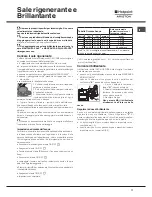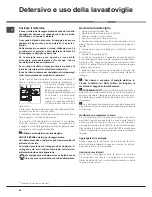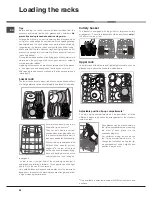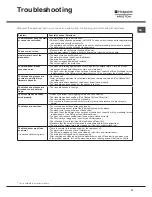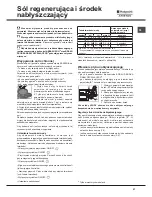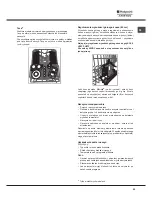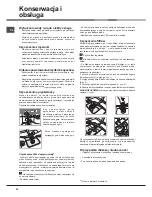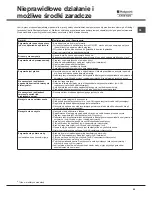
31
EN
Wash-cycle data is measured under laboratory conditions according to European Standard EN 50242.
Based on the different conditions of use, the wash-cycle duration and data can change.
The number and type of wash cycles and options may vary depending on the dishwasher model.
Wash cycles
Wash cycle
Wash cycle
which
include
drying
Options
Approximate
duration of wash
cycles
Water
consumption
(l/cycle)
Energy
consumption
(KWh/cycle)
Eco
Yes
No
03:00’
10
0,9
Intensive
Yes
No
02:30’
14
1,3
Normal
Yes
No
02:00’
13,5
1,1
Express
No
No
00:40’
9
0,8
Soak
No
No
00:10’
4,0
0,01
Half Load
Yes
No
01:20’
10,5
0,95
Instructions on wash cycle selection and detergent dosage
1.
The ECO wash cycle is the standard cycle to which the energy label data refers. It can be used to wash crockery with a normal
soil level and it is the most efficient cycle in terms of energy and water consumption for this type of crockery. 4 gr/ml
**+
21 gr/ml – 1
Tab
(
**
Quantity of pre-washing detergent)
2.
Heavily soiled dishes and pans (not to be used for delicate items). 25 gr/ml – 1 Tab
3.
Normally soiled pans and dishes. 4 gr/ml
**+
21 gr/ml – 1 Tab
4.
Fast cycle to be used for lightly soiled dishes (Ideal for 2 place settings) 21 gr/ml – 1 Tab
5.
Pre-wash for dishes while awaiting completion of the load with the dishes from the next meal. No detergent
6.
Ideal cycle for a reduced load of normally soiled dishes. 21 gr/ml – 1 Tab
Standby consumption: Left-on mode consumption: 5 W - Off mode consumption: 0.5 W
Notes:
Optimum performance levels when using the “Daily" and "Express” cycles can be achieved by respecting the specified
number of place settings.
To reduce consumption even further, only run the dishwasher when it is full.
Note for Test Laboratories:
for information on comparative EN testing conditions, please send an email to the following
address: [email protected]

